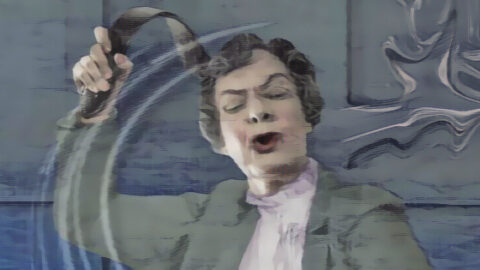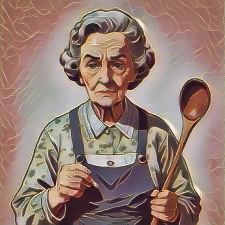My mother was a bus conductress, known as a clippie in those days. She wore a smart navy uniform, always pressed to perfection, and a little cap perched at a jaunty angle. Even after hours spent weaving through the city’s winding streets, she would step off the bus with her heels clicking confidently on the pavement, her posture as upright as a parade sergeant. I remember the way her dark tan stockings caught the afternoon light, a detail that seemed trivial then, but would later become a vivid thread in the tapestry of my memory. Even when the world moved on to those dreadful tights, Mother clung to her stockings, a small act of rebellion against changing times. She was a woman of routine, of pride, and of a cheerfulness that seemed to brighten even the dreariest London drizzle.
I was, by all accounts, an ordinary boy—restless, curious, and always eager to test the boundaries of the world around me. In those days, corporal punishment was as much a part of the landscape as the corner shop or the red-brick schoolhouse, but I do not recall ever being on the receiving end of a proper smack. Nor did I particularly crave one, though I was, as my teachers often said, “cheeky as a sparrow.” Insolence, I suppose, was my way of learning the rules—pushing, prodding, and sometimes tumbling over the invisible lines that separated childhood mischief from outright naughtiness. It was a time before screens and gadgets, when the world outside was a boundless playground, and innocence was measured in scraped knees and muddy shoes.
Every afternoon, as the school bell released us into the golden haze of late day, I would make my way to Mrs Bell’s house next door. She was a widow, her husband’s absence a quiet ache in the air, but she filled her home with warmth and gentle laughter. Our daily ritual was a comfort to us both: I would sit at her kitchen table, swinging my legs, while she poured tea and told stories of her youth. Sometimes, I would help her with small chores, or we would play cards until the familiar rumble of the bus signaled Mother’s return. The bus would stop—just for her—right outside our house, a small kindness from the driver, and I would watch as Mother stepped down, her cap slightly askew, her smile already searching for me.
As I grew older, my confidence blossomed into mischief. I delighted in playing harmless tricks on Mrs Bell, who always saw through my schemes with a twinkle in her eye. One crisp autumn afternoon, she sent me to the corner shop for a loaf of bread and a packet of tea. The shop was a wonderland—shelves lined with jars of sweets, the air thick with the scent of sugar and old wood. When I returned, Mrs Bell asked for her change. I held out an empty hand, feigning innocence, while my other hand—clenched tightly behind my back—hid the coins. She raised an eyebrow, her lips twitching with amusement, and demanded to see my other hand. With a flourish, I swapped the coins from one hand to the other, presenting them as if by magic. It was a game we both knew well, a dance of wits and affection.
For the first time I can remember, Mrs Bell threatened me with a smacked bottom. Her voice was mock-serious, but her eyes sparkled with mischief. I played along, slipping the change into my back pocket and holding out both hands, empty and triumphant. The moment was thick with laughter and the unspoken understanding that this was all in fun—a ritual of childhood, as old as time.
“Paul,” she declared, “if that money is not on my table in two shakes of a lamb’s tail, I shall pick you up by your ankles and shake it out of you!” Her words hung in the air, half threat, half invitation to continue the game. After a brief standoff, I surrendered, fishing the coins from my pocket and dropping them onto the table with a flourish, grinning from ear to ear.
Just then, the bus hissed to a stop outside, and Mother appeared at the end of the drive, her silhouette framed by the fading light. Mrs Bell wasted no time in recounting my little prank, her voice rising with mock outrage. “If I had any say in the matter,” she told Mother, “he would be sent to bed with a well-smacked bottom for his trouble!” Mother laughed, her eyes crinkling at the corners, and replied, “Do not worry—I shall deal with this one later!” There was a sense of camaraderie between the two women, a shared understanding of the rituals that shaped boys into men.
As we left, Mrs Bell called after me, “If your mother does not put you across her knee tonight, there is no justice in this world—such an insolent boy you are!” Her words were playful, but I sensed a wistfulness beneath the laughter, as if she missed the days when her own children had filled the house with noise and mischief. Mother thanked her for keeping an eye on me, and I felt a surge of gratitude for the gentle web of care that surrounded my childhood. Looking back, I think Mrs Bell would have relished the chance to deliver a playful smack herself, a final act of affection for the boy next door.
The whole exchange lasted only seconds, but it lingered in my mind as we waved goodnight and slipped through the side gate. Inside, the house was warm and familiar, the kitchen filled with the scent of onions and simmering stew. I recounted my antics to Mother, expecting nothing more than a laugh, and she obliged, shaking her head at my cheekiness.
Yet amid the laughter, Mother’s tone shifted. “Actually, I agree with Mrs Bell. You do deserve a smacked bottom. I shall deal with this matter at bedtime.” Her words were light, but there was a glint of resolve in her eyes. I shrugged it off, certain that it was just another part of the game, and wandered off to do my homework, the threat already fading from my mind.
I sat at the kitchen table, pencil in hand, the ticking of the clock marking the slow passage of time. Outside, the garden beckoned, and soon I was lost in a world of make-believe—climbing trees, chasing shadows, and forgetting all about the promise of discipline that awaited me. By the time dusk settled over the rooftops, I had all but forgotten Mother’s words. I had seen smacked bottoms at school—quick, efficient, and always followed by a return to normalcy. Two boys I knew had even been caned for fighting, their bravado quickly replaced by sheepish silence. I was not entirely innocent, but the idea of being spanked at home seemed almost unreal.
As the last light faded, Mother called me in from the garden. The kitchen was bathed in the soft glow of the overhead lamp, and the air was thick with the promise of bedtime. “I shall be up soon to deal with you,” she said, her voice calm but firm. I was surprised—perhaps even a little curious—that she intended to follow through. I stuck out my tongue, half in jest, and she smiled, though her eyes warned me not to push my luck. “You will soon be sorry you did that!” she added, and I scampered off to wash and change, my heart fluttering with a strange mix of anticipation and excitement.
Mother entered my room a few minutes later, her uniform slightly rumpled, her hair escaping its pins. She checked my school things with practiced efficiency, her hands moving briskly from shirt to shoes to satchel. Then she turned to me, hands on hips, her expression suddenly serious. “Right then, young man, we have to have a little talk, do we not?” Her voice was low, almost conspiratorial, as if she were inviting me into a secret society of childhood lessons.
I dove beneath the covers, giggling, pulling the blankets up to my chin in a mock attempt at escape. Mother’s smile widened, and for a moment, we were both actors in a pantomime, each playing our part to perfection. “Oh no, you do not!” she cried, her voice ringing with laughter and authority.
In a flash, she seized me by the ear—a gentle but unyielding grip that left no room for argument—and drew me from the safety of my bed. My laughter echoed off the walls, mingling with the sound of her heels on the floorboards. There was a thrill in the air, a sense that something important was about to happen, though neither of us could have said exactly what. She marched me to the bedroom chair, her movements swift and sure, and in one fluid motion, she sat and pulled me across her lap. I found myself suspended, my feet dangling above the carpet, my nose nearly brushing the floor as she crossed her legs and adjusted my position.
(short pause) Now, let me recount the incident in the manner of a ‘Just William’ tale, as would have beenfit the 1950s, with all the proper decorum and a touch of gentle humour. The reason for my impending chastisement was, of course, my impish behaviour with Mrs Bell—the concealment of her change and the cheeky display of sleight of hand, which, though intended in jest, was deemed by both ladies to be a step too far in the direction of insolence. It was not the act itself, but the spirit of mischief and the refusal to yield when gently admonished, that brought about my fate.
Mother, ever the model of firm but fair discipline, explained in clear and measured tones that a boy must learn the difference between harmless fun and disrespect. “A lesson, my boy,” she intoned, “is best remembered when it is felt as well as heard.” With that, she produced her slipper—a modest, well-worn house shoe, more symbolic than severe. There was no anger in her manner, only a sense of duty, and perhaps a twinkle of amusement at the whole performance.
The spanking itself was delivered with all the ceremony of a household ritual. I received three brisk smacks, each accompanied by a gentle admonition: “For cheek,” “For mischief,” and “For not listening to Mrs Bell.” The sensation was more startling than painful, and I could not help but let out a yelp, half genuine, half for dramatic effect. Mother, for her part, maintained a straight face, though I am certain she was suppressing a smile.
When it was over, I was set upon my feet and told, in no uncertain terms, that the matter was finished. There was no lingering resentment, no sulking or tears—only a sense of relief and, oddly enough, pride at having survived my first proper encounter with discipline at home. Mother ruffled my hair, declaring, “You’ll remember next time, I trust!” and I nodded, suitably chastened but secretly pleased at the attention.
The lesson, as it turned out, was not so much about the sting of the slipper, but about the boundaries of good behaviour and the importance of respect for those who care for us. Mrs Bell, upon hearing the tale the next day, declared that justice had been served and pressed a biscuit into my hand as a peace offering. I, for my part, resolved to keep my tricks within the bounds of good humour, and to remember that even the cheekiest of boys must, from time to time, submit to the wisdom of their elders.
And so, the incident of the slipper passed into family legend, recounted with laughter at every gathering, a gentle reminder that childhood is as much about learning lessons as it is about making memories.






























































